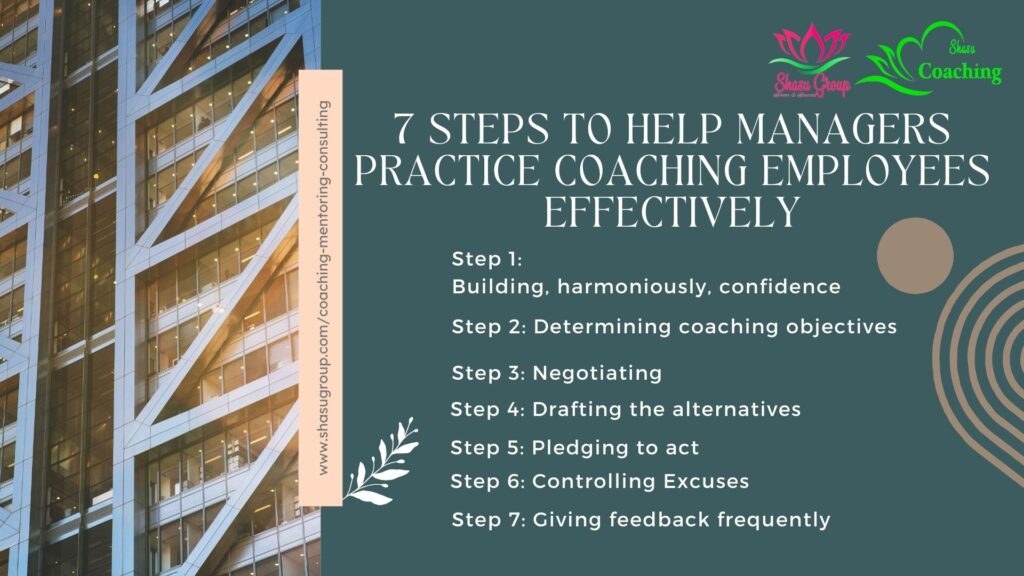What are the best practices for coaching?
Here are my top 10 “best practices” to help you coach your team.
1. Check in on key action areas in a consistent way.
You can ask:
“_____, last time we talked on _____ you said you were going to make ___________. How did that go?”
Or
“How are you doing on Focus Area One of your action plan – ‘streamlining operations in production’?”
2. Assist them in troubleshooting and problem solving if they become stuck.
You should keep in mind that coaching will not assist them in solving the problem; rather, it will assist them in defining the problem, clarifying what a solution would need to do for them, creating options that would meet these success criteria, and then assisting them in thinking through and selecting the best solution to begin with.
Finally, you must observe whether or not their solution is or is not working so that they can adjust based on what occurs.
Remember to ask questions, guide, and listen rather than jumping in to rescue or solve.
3. Advising them when they are in a “crisis.”
“I’m in shock, I just found out that…” they say.
Make sure you understand the problem (and if it is big issue, what are the root causes so you deal with right thing.)

Reduce your fear. Assist them in framing the real risks they face AND Potential fears
“What is the most likely worst-case scenario in this situation? Can you handle it?”
Ask them about their tolerance if the baddest case happened and help them come up with a plan to deal with it
Determine how you can best assist them. Give them trust and confidence.
4. Help them sharpen their ideas and think things all the way through.
Not only assist them in solving problems, you also help them to sharpen their ideas, practice being ability to think positively so they can see more think positively
5. Engage them in the quarterly strategic planning process.
Get them into the habit of regularly planning their work so that they can anticipate possible situations and deal with them more effectively.
6. Keep their action plan handy and review it weekly.
This helps you know what to be looking for in their actions and reporting.
7. Coach builds respectful rapport.
For the coaching process to go well, both sides need to build a relationship of mutual respect. During the discussion, both sides should attentive listening, use of routines/ norms, and establish a reflective, questioning state of mind.
8. Recap and numerate these action commitments at the end of each coaching conversation.
Ask them to summarize and commit what they will do before the next meeting occurs. This helps them be more responsible for their work and words and it also speeds up their work.
9. Know when and how to best support and coach each individual team member you’re working to develop.
This is not a rote formula. Every team member is different.
Some people need a supportive tone: E.g. “Tina, it’s okay that you got pulled into handling a few crisis situations and didn’t get X done. What can I do to best support you in making sure you get this done before our next session?” [Notice the tone is warm, supportive, and friendly.]
Some people need a direct and firm hand: E.g. “Joe, on our last session you committed to getting X done before this call. I get that you weren’t able to get that done. Are you going to find a way to get that done in the coming week? Is it still important to get done. Great. Then I ask that you do it by next Tuesday and shoot me a quick email saying “done”. Are you willing to commit to that?” [Notice the tone is firmer and more powerful.]
Why is Leadership Coaching Important?
1. Empowerment
Coaching empowers leaders to do exceptional work. Through empowerment, leaders can work on their decisions. As a result, coaches can know where their strengths and weaknesses are to help them improve themselves.
2. New Insight
Leaders gain a new perspective on everyday responsibilities from their coach. Together, they discover new insights into the leader’s reaction by analyzing the problem and creating a plan for similar situations in the future.

3. Free Thinking
Coaches encourage leaders to Free Thinking to solve problems on their own. And you are just a contributor. This helps the leader to stimulate free thinking and encourages flexible leadership.
4. Enhanced Performance
Coaching allows the leader to learn and implement new leadership techniques tailored to the leader’s weaknesses.
Techniques include the leader avoiding the terms “but,” “no,” or “however” as they accidentally discourage ideas or answering questions with questions as they tend to supply all the ideas for their team. Individuals that were difficult to reach before will respond better to their leader’s new approaches.
5. Improved Communication
Coaches will identify areas of communication that need to be improved and work with the leader to improve those areas.
Coaches can also teach leaders how to communicate with people of different personality types, cultures, or ages by using examples from their own experiences.
People can connect with one another when they have good communication skills. A coach who can help an individual improve their communication skills will boost their credibility and overall leadership abilities.
Why is employee coaching important in leadership?
Coaching assists business leaders in developing emotional intelligence, which includes increased self-awareness, empathy, and self-control. Professional coaches provide observations and feedback on individual performance and assist leaders in developing personal improvement strategies
Follow us: https://training.shasugroup.com/
7 steps to help managers practice coaching employees effectively
Step 1: Building Collective relationship based on trust
To develop harmoniously, both bosses and employees must have confidence in each other. As a result, the two sides can learn from each other and build a closer relationship.
Step 2: Determining coaching objectives
Before organizing coaching sessions, the manager needs to present goals and positive reasons for the coaching courses. In order to encourage employees to participate, it is necessary to show the reasons which are helpful for business and employee promotion.
Step 3: Negotiating about appropriate and inappropriate behaviors together with presenting consequences and objectives.

Leaders must be dexterous in employee coaching practice so that employees wouldn’t feel stressful and pressured. Moreover, leaders need to explain to them the consequences of neither changing behavior nor developing themselves.
Step 4: Drafting the alternatives
Leaders need to identify problems as well as attain objective agreement, afterwards, exhorting employees to come up with different solutions to solve the problems.
Instead of helping employees, make suggestions for solutions and let them choose the most suitable ones for themselves. Meanwhile, you are just an onlooker standing outside and playing as a counselor.
Step 5: Pledging to act
To carry out this step, managers must pledge with employees on what to do. The rule to remember is not to choose to replace employees but to promote their ability to manage to make their own solutions.
Step 6: Controlling Excuses
During the discussion and coaching process, employees will make justifications for their own actions. Avoid aggravating problems, managers can present their points of view with a positive and open attitude. Employees can give their opinions in the most open-hearted way.
Step 7: Giving feedback frequently
Managers also need to give feedback for employees on a regular basis, both compliment and recommendations for employees’ sake.
Collection & Edit by Marketing Dept from Shasu Coaching & Shasu Mentoring
Reference
- https://eleducation.org/resources/effective-coaching-practices
- https://www.insala.com/blog/why-is-leadership-coaching-important-the-5-key-benefits
- https://eleducation.org/resources/effective-coaching-practices
- https://www.inc.com/david-finkel/the-10-key-coaching-best-practices-to-develop-your-team-members.html
Learn more about our services: https://news.shasu-group.com/category/tin-tuc/shasu-consultant-coach-mentor/
Contact Ms. Thảo Hồ for Coaching & Mentoring Services from Shasu https://www.shasugroup.com/coaching-mentoring-consulting
Follow us:














